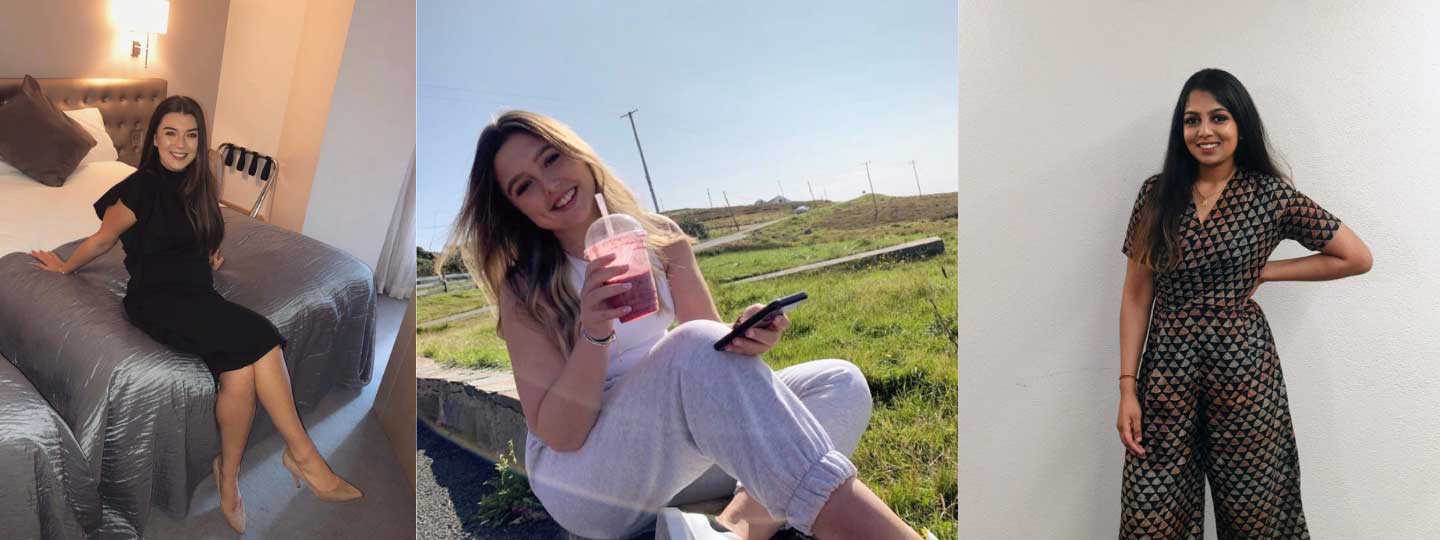Three young people with arthritis tell us what they’ve learnt.
17 March 2022
On the 18 March every year is World Young Rheumatic Diseases day, commonly known as WORD day.
The day raises awareness that young people get rheumatic conditions too, with an emphasis on knowledge, research and the importance of early diagnosis.
We spoke to Jasmine, Suruthi and Alex, all members of our Young Person’s Advisory Panel, about what WORD day means to them and their experiences of living with arthritis as a young person.
Jasmine, 22, recently received a first class in her dissertation. She has had juvenile idiopathic arthritis (JIA) since one and uveitis since the age of two.
Suruthi, 23, is currently studying for her PhD in Sheffield. She has had JIA since the age of three.
Alex, 26, graduated from De Montfort University in 2017 and is now working as a marketing executive. She was diagnosed with ankylosing spondylitis (AS) at 23 but had symptoms since 16.
What does WORD day mean to you?
Jasmine: Arthritis in children is often overlooked because it’s an invisible disease and so can be difficult to understand what it’s actually like to live with the condition. WORD day helps to raise more awareness and create an understanding of living with arthritis as a young person.
Suruthi: WORD day to me is a really important day for raising awareness about rheumatic diseases in young people, as I think a lot of people are still unaware of the fact it can affect all ages.
If you could tell your younger self anything, what would you say?
Jasmine: I would like to tell my younger self that having arthritis has shaped me as a person – I am much stronger and more persevering than I would be without it.
Having arthritis has also opened so many opportunities for me: being on the Versus Arthritis Young Person’s Advisory Panel and the Paediatric Rheumatology clinical studies group.
I think I can help to shape the future of paediatric rheumatology and I’ve also met some amazing people.
Suruthi: I think I would tell my younger self to never stop aiming high. I used to worry a lot about if I would still be able to achieve my goals with my arthritis, but I have learned over the years that your condition doesn't have to stop you doing what you want. You just might have to go about it differently to how you initially imagined.
Alex: I had symptoms of AS from around 16 years old. It started with lower back pain and extreme tiredness. I would tell people my back hurt and that I was tired, but people would just agree with me and tell me they felt tired and had a ‘bad back’ too.
I got to the point where I thought it was normal to feel that way. Deep down I always knew something was wrong. Listen to your body. If you feel like something is not right, go to the doctors.
What have you learnt during the COVID-19 pandemic?
Jasmine: I have learnt to listen to my body. If I need to rest that’s completely acceptable and I shouldn’t feel guilty for it. You have to do what is best for you and not put too much pressure on yourself, otherwise I will only end up in a flare!
Suruthi: I’ve learnt that my coping mechanism is often spending time with my family. It helps me put things into perspective and remember all the things I am grateful for.
Alex: I’m trying not to be so hard on myself. Sometimes it’s easy to look around and compare yourself to everyone else. I’m doing the best I can. Living with AS can be hard enough in itself, so don’t be so hard on yourself. You are doing fab!
What would you like wider society to know about living with arthritis?
Jasmine: I’d like society to remember that arthritis is an invisible condition, and it can affect anybody of any age. I’d like people to think twice about invisible conditions as what you see on the outside isn’t a true reflection of what’s happening inside.
I’d like people to understand that I’m not “fine” one day and “sick” the next day. My symptoms can just go from being more manageable one day and then all of a sudden, I’m unable to get out of bed the next day.
Suruthi: I wish people knew that not only can arthritis affect young people but it’s an invisible illness and very unpredictable.
A lot of people struggle to grasp the concept of dynamic disabilities and how one day I can walk five miles but, a week on, I might struggle to even get out of bed. I think sometimes people think you're faking it because they don't understand just how unpredictable the condition is.
Alex: If people had a better understanding of how arthritis can affect younger people, especially teenagers, then perhaps my diagnosis would have come a lot quicker. I had no idea how many different types of arthritis there were until I joined the Young Person’s Advisory Panel.
I’m passionate about raising awareness of the symptoms of AS specifically. It can be easily misunderstood as normal back pain and tiredness that everyone experiences, so it’s easily missed.
Our services
If you or a family member under the age of 25 has arthritis, we run a Young People and Families service that provides information and support and puts on a range of events across the country.
Our service helps young people and children offers advice on how to live well with arthritis, medication and potential treatments, as well as creating a safe space to ask questions, receive information and develop support networks.
Find out more about our Young People and Families service.